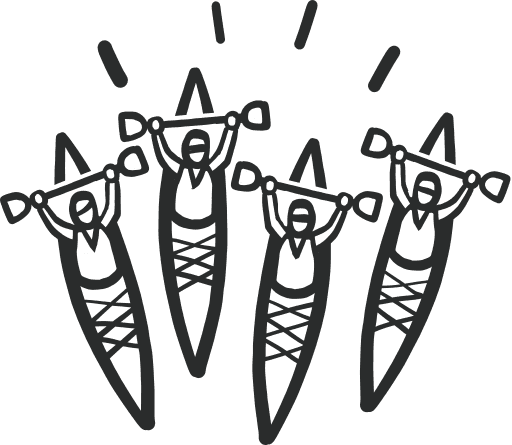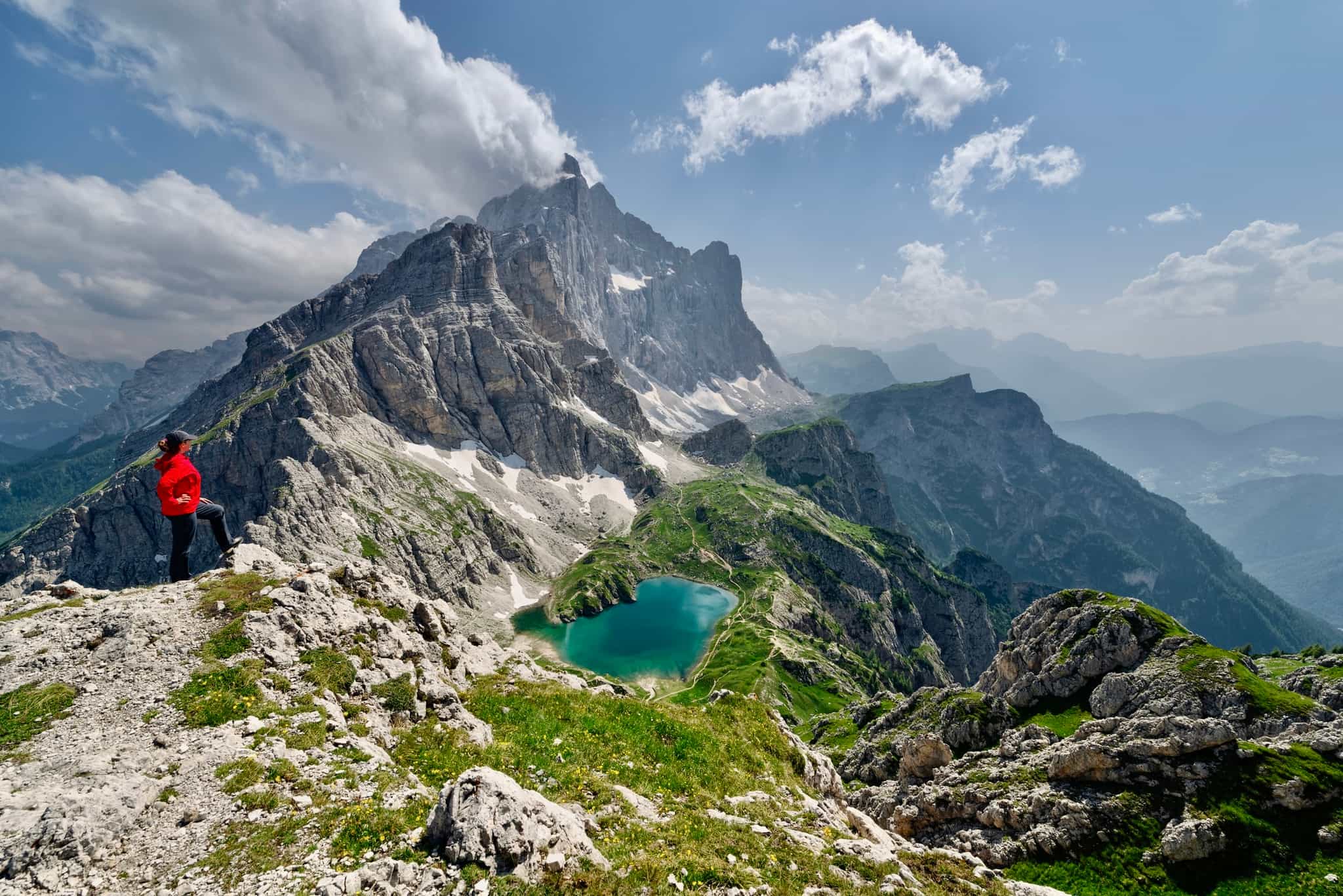
Hut-to-Hut Trekking in the Dolomites
Uncover Italy's most iconic mountain range as you trek along some of the most varied sections of the Alta Via 1 and Alta Via 2
What's Included?
Activities & Certified Guides
All itinerary activities with expert, local, English-speaking mountain guideHotel & Mountain hut
2 nights in hotels and 3 nights in mountain hutsMeals
All breakfasts and dinnersTransfers
Airport transfers and everything in betweenPorterage
2 luggage transfers during the trekSmall Like-minded Groups
Solo-friendly by design, join our small n’ sociable groups of up to 7 like-minded, active and outdoorsy people…
…
What's it like?






























Hike beneath the towering walls and pinnacles of Civetta (3220m) and Marmolada (3343m), passing the glittering glacial waters of Lake Coldai
Trek quiet paths amongst this dramatic landscape, through lush forests and blooming meadows teeming with wildlife
Bed down in comfortable, small-scale refuges deep in the Dolomites and fuel up on delicious mountain food
Check out Hike the Dolomites: The Hotel Edition if you prefer to sleep in a spa hotel between hikes
Key Information
Day 1
Welcome to the Dolomites!
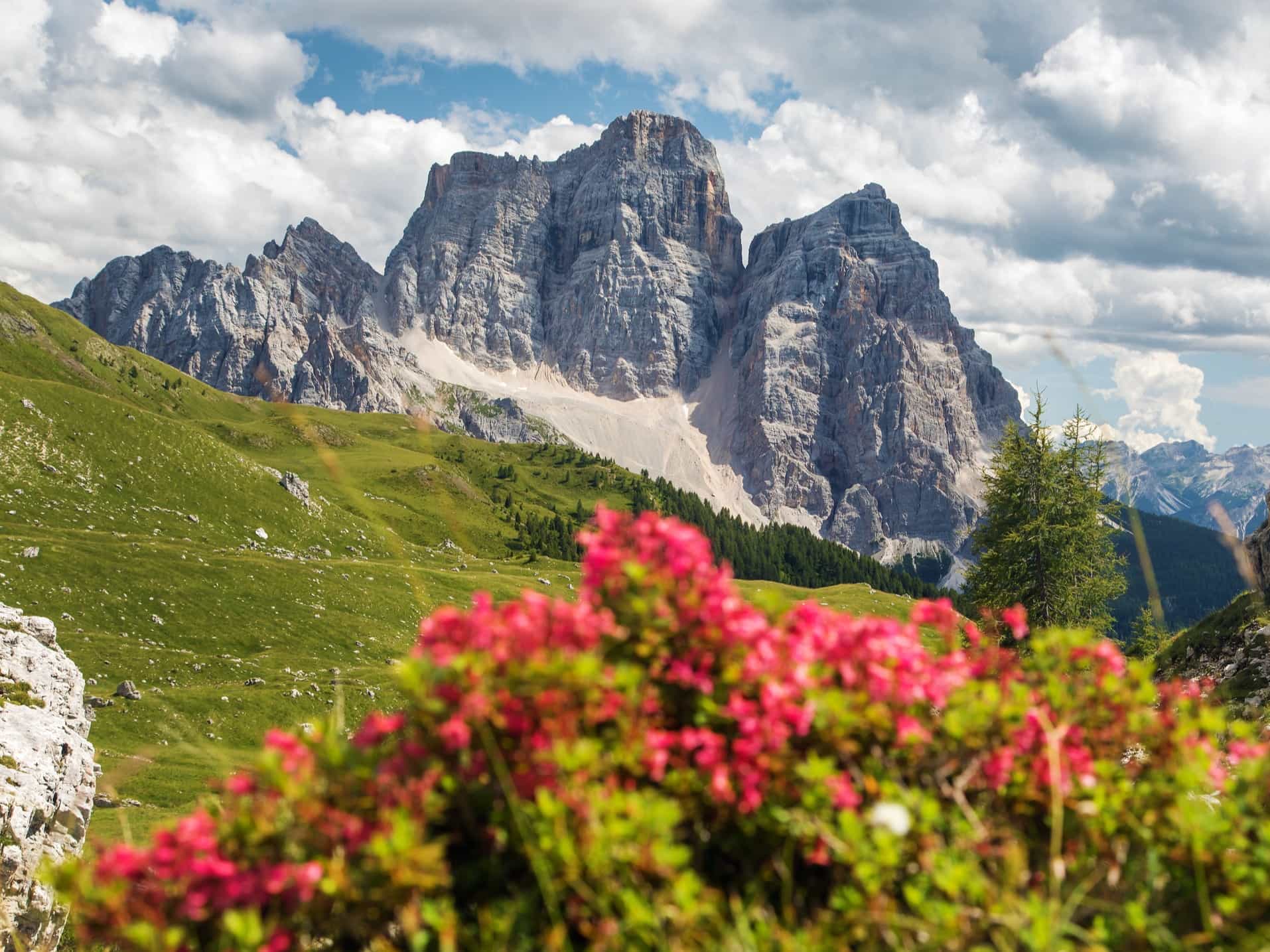
Driving
Meet your driver at Venice Airport and jump in your transfer to Selva di Cadore, right in the heart of Italy's iconic Dolomites – a UNESCO World Heritage Site. Check in your comfortable spa hotel and enjoy the sight of some of the most famous peaks such as towering Mount Pelmo, the spires of Cernera and jagged Civetta, right from your hotel's doorstep. Before dinner with the group at the hotel, you'll have time to do any repacking required and then your host will collect your main bag for storage. You needn't pack too much in your hiking backpack, just the essentials for the next three days, as you'll have a chance to access your main luggage again during the transfer on Day 4. Your mountain guide will join you in the morning of Day 2 to go through the details of the trek before you set off.
Day 2
The trek begins: Alta Via 1 to Rifugio Tissi
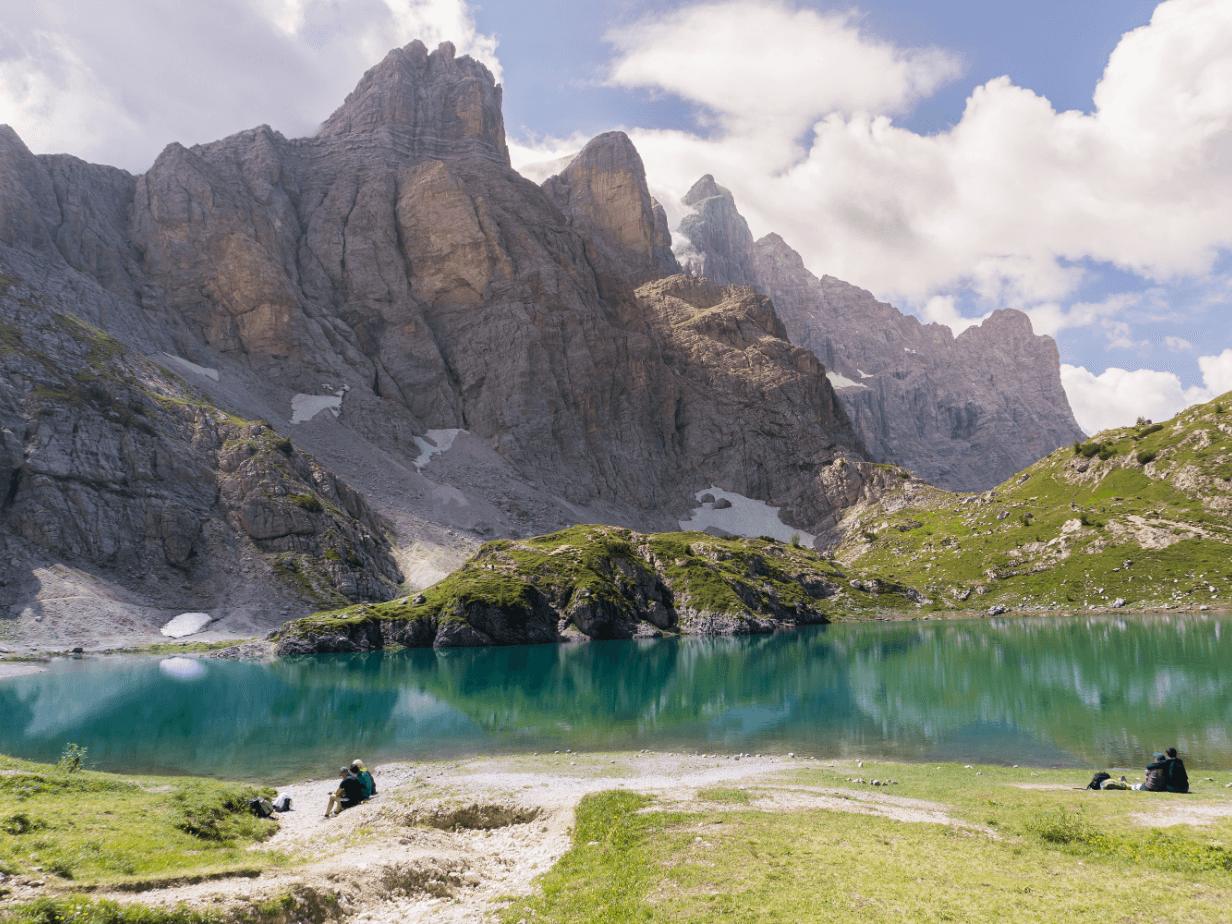
Hiking
Kickstart your adventure with a stunning trek to Tissi Refuge. Set off on dirt roads through lush conifer woods and the pastures of the Val Fiorentina until reaching the Col dei Baldi area, which offers spectacular views over the Central Dolomites and their mighty peaks (including Mondeval, Croda Da Lago, Marmolada and Pelmo). From here you'll follow a variant of the iconic Alta Via 1 trail, which will lead to the Coldai Refuge – a chance to refuel with a hearty lunch. Continue on to until you reach the spectacular Coldai Lake (2172m), reflecting the majestic towers of the Civetta in its turquoise waters. Push on with a final climb – mostly steady, but with the occasional steep section of rough terrain as you traverse the mighty ‘wall of walls’. This is Civetta’s western face, measuring 1200m in height and over 5000m in width! Reach Tissi Refuge, set in a breathtaking location facing the giant limestone mountain walls, where you can relax over a delicious hot dinner, enjoy the warm hospitality and bed down for the night in comfortable four-bed dorm rooms.
Day 3
Deeper into the Dolomites
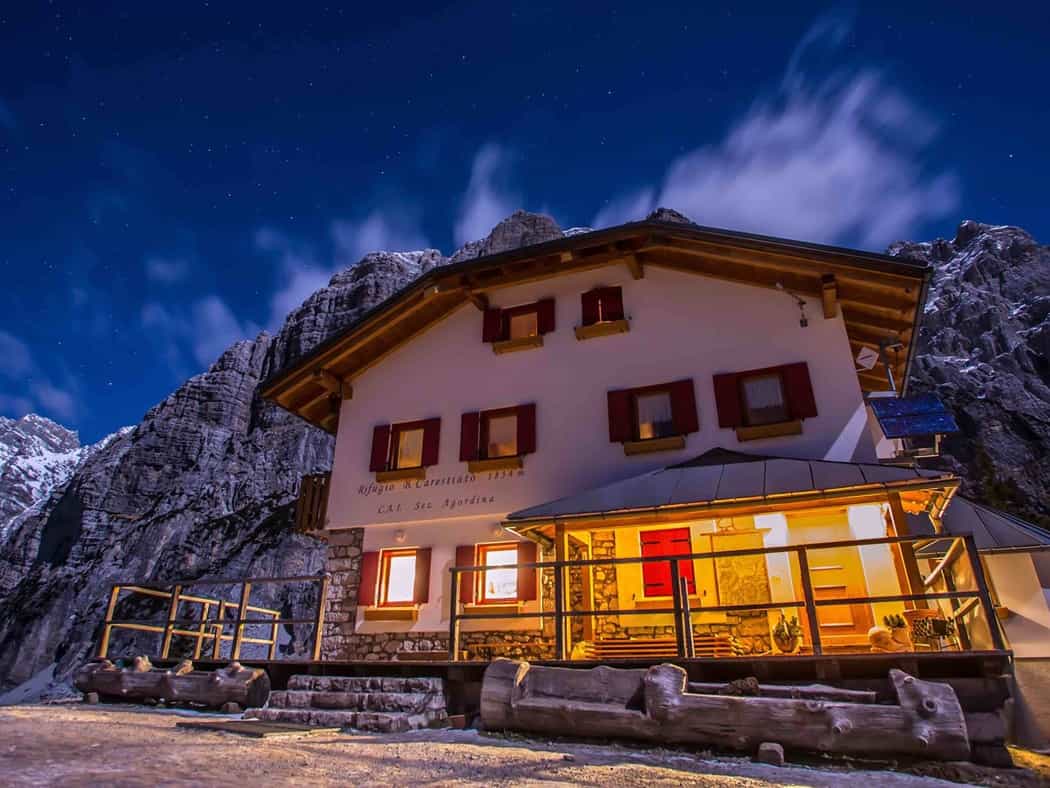
Hiking
Today you'll cross into the wild landscapes of the Moiazza range. You will notice that fewer trekkers make it this far along the route, making the hiking experience extra-special. Set off on a relatively smooth descent into Val Civetta passing over rocks, through shrubs and green pastures. For the first part of the trek you'll be surrounded by trees and the impressive rock towers of the Civetta massif. Reach Rifugio Vazzoler, nestled amongst woodland with dramatic views of the Torre Venezia and Torre Trieste as a backdrop, where you can grab some refreshments before pushing on towards Forcella Col dell’Orso (1823m), along the flanks of Torre Trieste and Forcella del Camp. A final ascent through more woodland will bring you to the welcoming Rifugio Carestiato, where a well-deserved dinner awaits.
Day 4
Hike into Val Ombretta, the heart of the Dolomites
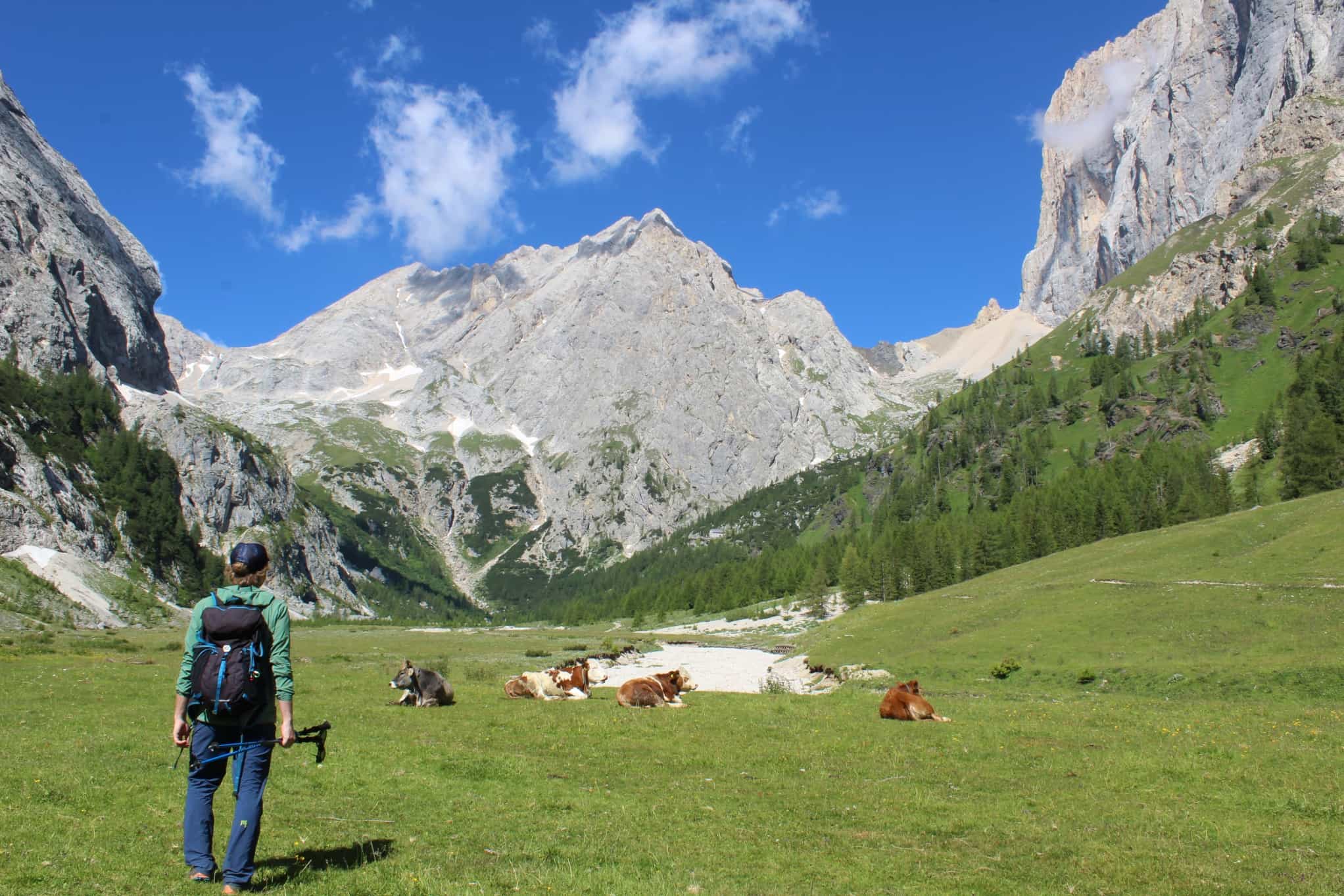
Hiking
Driving
After breakfast, set off from Rifugio Carestiato and enjoy a panoramic descent down the valley. Admire the splendid Alpine views all the way into Agordo. Your host will meet you at the end of the trail with the van and your main bag that you gave them on Day 1, so that you can swap out your dirty clothes for clean ones if you wish. There's also a restaurant nearby for an early lunch. After approx. 1hr stop in Agordo, you'll then take a short transfer to the charming Malga Ciapela for the continuation of your trek. From there, set off on foot into the enchanting Val Ombretta, with the dramatic southern face of Marmolada visible in the distance. Despite the loftiness of the surrounding peaks, the rest of today's trail is relatively smooth so you have plenty of time to take in the views. Stop at Malga Ombretta (don't miss the chance to try their famous yogurt) before continuing along the the uphill trail, where where a totem marks the central geographical point of the Dolomites. Bed down for the night at the renowned Onorio Falier Refuge, which has stunning views of the south face of Marmolada's peak.
Day 5
Alpine meadows and pristine nature
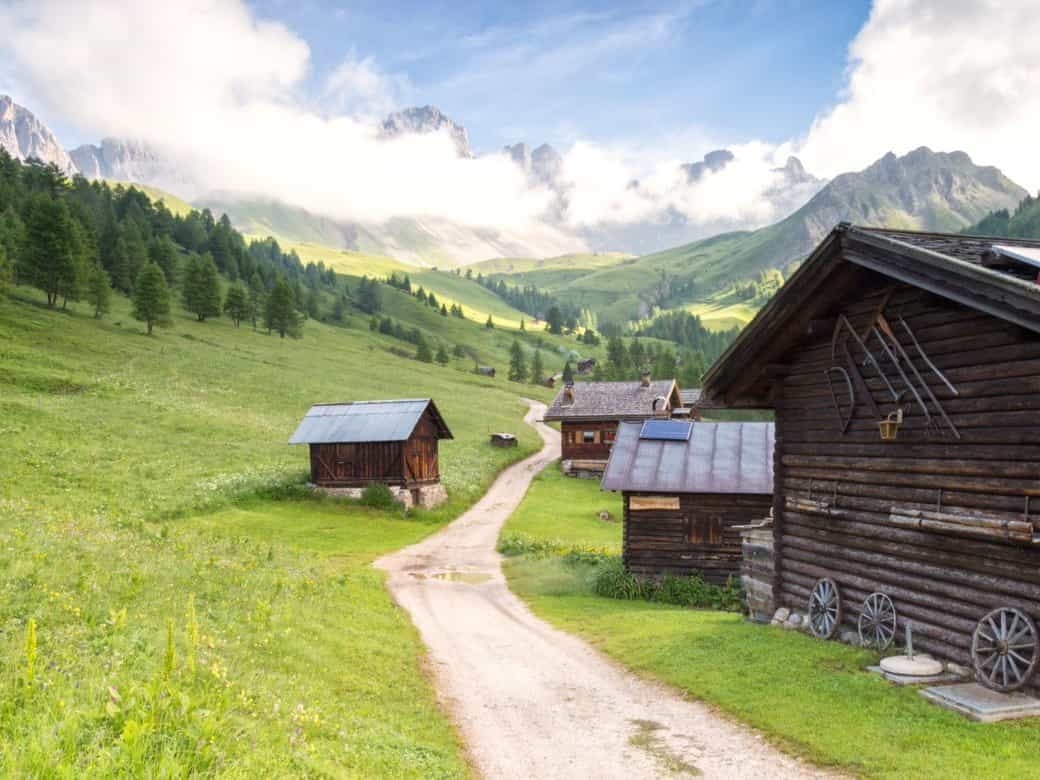
Hiking
This morning you'll descend from from Val Ombretta along the Val de Franzedaz and under the walls of Monte Fop, following a quieter variant of the Alta Via 2 to Forcella di Forca Rossa. You'll then join a picturesque trail known as the Alta Via dei Pastori (High Shepherd's Way), an ancient shepherds' path which links the pastures and mountain huts of the Val del Biois, via centuries-old woodland where close encounters with local fauna such as marmots and ibex are common. Your host will have transferred your main luggage to the hotel ahead of your arrival, ready for you to take a shower and get out of your hiking kit. Your home tonight is the stunning and comparatively luxurious Rifugio Flora Alpina, or the equally lovely Hotel Costabella if visiting mid-September onwards. Both properties offer comfortable en-suite rooms, an excellent restaurant & bar, and high quality wellness centres that include saunas, hot baths and sensory showers. An ideal location to relax and unwind from the adventures of your week. At dinner make a toast to the end of your epic trek with a spectacular view of the nearby peaks, then enjoy one final cosy sleep before you leave the mountains tomorrow.
Day 6
Goodbye mountains!
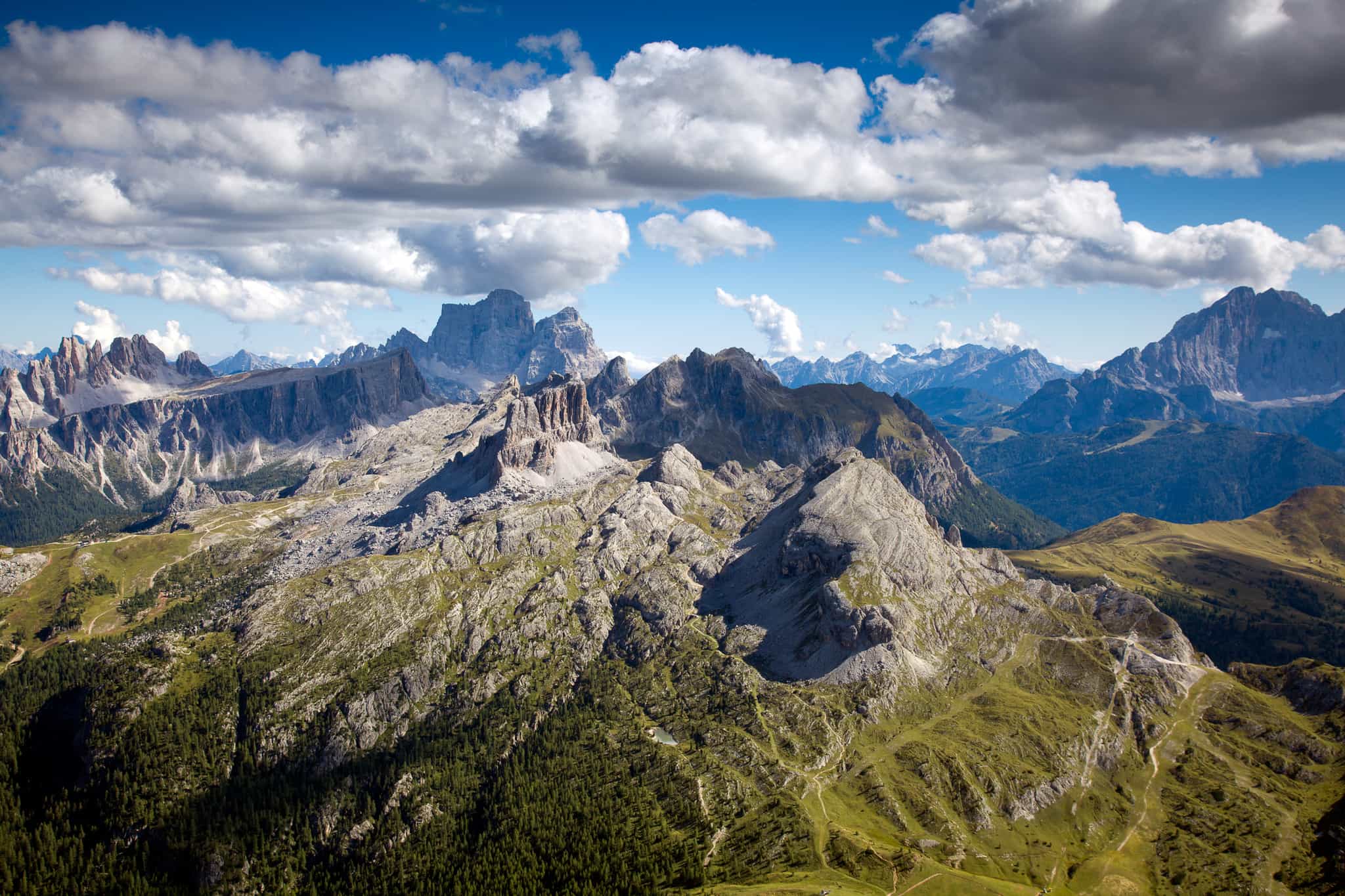
Driving
Enjoy a relaxing morning of free-time. Pre-breakfast sauna anyone? Or an easy stroll to stretch your legs and take in the mountain air one more time perhaps? Like all good things, your Dolomites adventure comes to an end mid-morning, when your host will meet you at the hotel and drive you back to Venice Airport in time for your onward flight home.
The Area
Logistics
Starts
Venice Marco Polo Airport
14:30 on Day 1
Ends
Venice Marco Polo Airport
13:30 on Day 6
Transfers
On Day 1 your driver will meet you at Venice Marco Polo Airport (at 14:30 at the latest; exact timings will be confirmed by your host prior to your trip, depending on the group's incoming flights). You'll be transferred to Selva di Cadore, which is approximately two hours away. On the final Day 6, your host will transfer you from Passo San Pellegrino back to Venice Marco Polo Airport, where you'll arrive at around 13:30. This can be dependent on traffic, therefore please don't book a flight departing before 16:00 on Day 6 in case of delays.
Please note that alternative transfers between the airport and the Dolomites are very expensive, whilst connections by public transport are limited and often not available: we therefore recommend that in order to join the group transfer, you ensure you leave ample time between your flight arrival time and transfer departure time of 14:30. Your transfer won't be able to wait much beyond 14:30, so in the case of significant delays, the best option is to get an official taxi which you can find just outside the terminal. This will be an expensive option (approx. €300) for a one-way transfer to Selva di Cadore. For more info and bookings you can contact +39 041 5964 (24-hour service) and for more details on the fare that will be applied, ask the taxi staff before getting on board. Please remember to let your host know if your journey is delayed.
Travel options
Venice Marco Polo Airport is accessible via various direct flights from the UK and mainland Europe. Flights from the US generally connect through Madrid, London or Frankfurt.
For those who wish to avoid flying, Venezia Mestre is well connected with high-speed trains from London, via Paris. The journey will take an average of 21 hours and usually involves two changes.
Given the trip begins with an afternoon transfer from Venice Airport, perhaps consider arriving the day before and take this opportunity to visit the beautiful UNESCO World Heritage city of canals, art and romance. When visiting Venice, check first if you are required to pay the Venice Access Fee - (applicable to some dates only)
Day 1
Breakfast
Lunch
Dinner
Day 2 – Day 4
Breakfast
Lunch
Dinner
Day 5
Breakfast
Lunch
Dinner
Day 6
Breakfast
Lunch
Dinner
What is the food like?
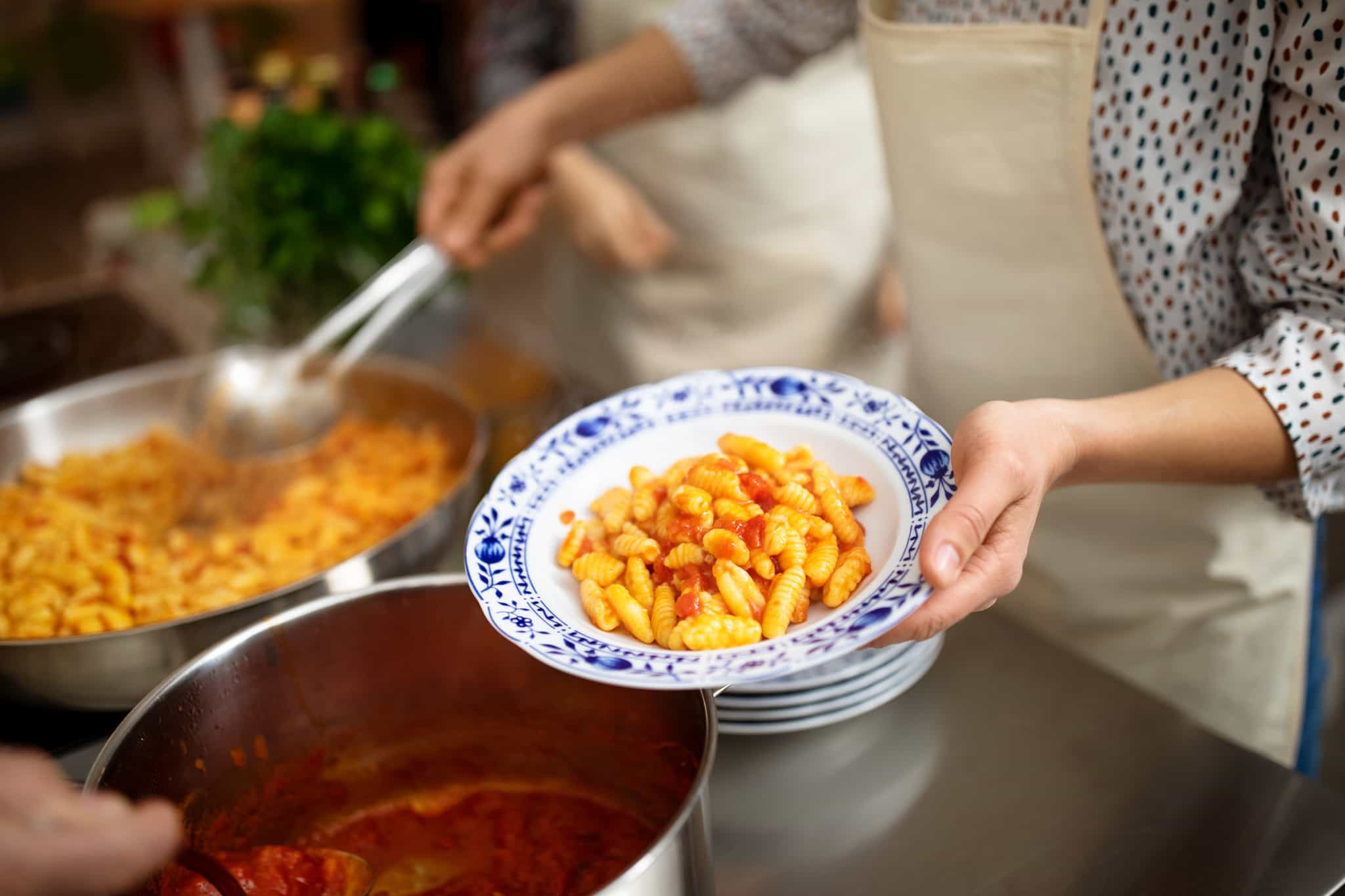
All breakfasts and evening meals are included on this trip. Dinner at the Hotel Orso Grigio on the first night is a set menu. In the mountain huts, you'll fuel up on hearty pasta, lentils, chickpeas, soups and meat-based dishes; simple, but all you need to refuel after a day of hiking. Lunches are not included, but you can buy your own as you'll stop each day at great mountain huts serving a choice of sandwiches or hot meals – some of the region's highlights include potato gnocchi with smoked cottage cheese or pumpkin, canederli (balls of bread with speck), and barley soup. Often, you'll find polenta with mushrooms and pastin (a regional dish of Belluno, usually comprising minced pork or beef) featured on the menu.
Vegetarians, vegans, pescatarians, lactose intolerance and gluten intolerance can be provided for on this trip, though in some locations, the options may be more limited. Please ensure that you note your dietary requirements on your passenger information form via your booking. If you have specific dietary needs, we suggest bringing a few of your own trail snacks to keep you fuelled on the go. Should you wish to check other dietary restrictions or allergies before booking, please contact our Customer Experience team for assistance.
What is the accommodation like?
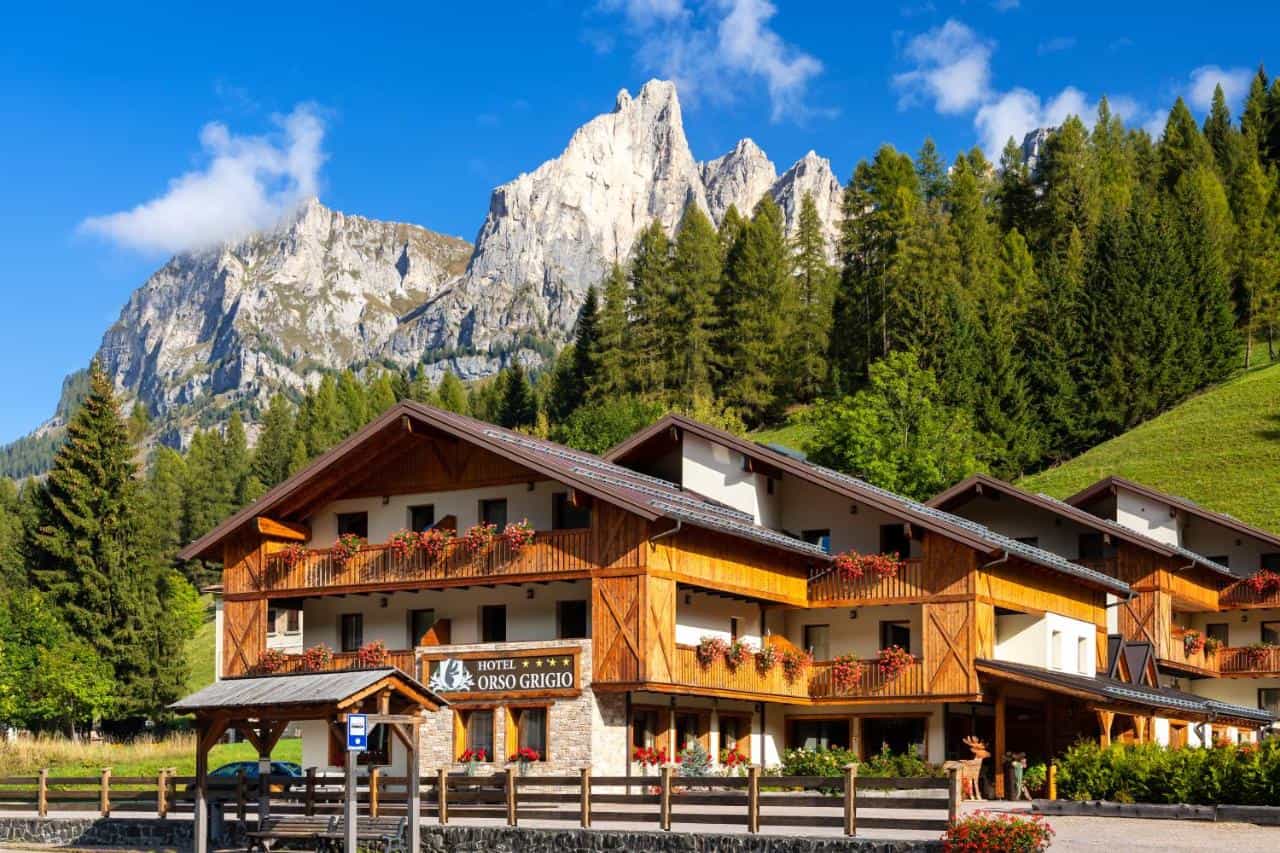
Pescul (Selva di Cadore)
Your first night will be spent at the 4-star Orso Grigio Hotel. Located right in front of the famous Civetta ski slopes in Pescul, it's 3km from Selva di Cadore and approximately 30km from the famous Cortina d'Ampezzo. This comfortable mountain retreat features a wellness centre with two Finnish saunas, sensory showers, a Turkish bath and relaxation area, perfect in which to relax after an active day out on the trails. Accommodation will be on a twin-share basis*, in en suite rooms with pine-wood furnishings, warm carpeting, fine fabrics, LCD TVs and stunning views. The hotel also includes a restaurant, which serves a delicious breakfast buffet and tasty local cuisine for dinner.
*Your host will try to arrange rooms on a twin-share basis where possible. Due to the popularity of the location in the summer season and the limited number of rooms available at the Hotel Orso Grigio, occasionally a triple room may be allocated to the group. Whilst it is not possible to pre-request a single room at this accommodation as an optional extra, if the hotel has had a late cancellation, there may be an extra room available to upgrade to at check-in, for a local supplement.
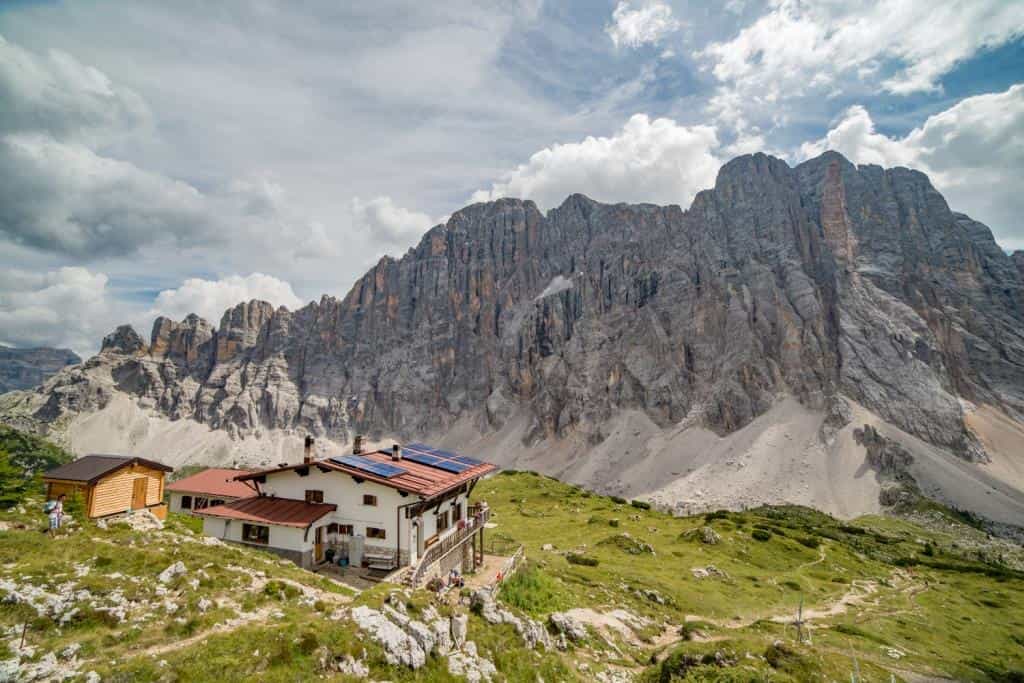
Mountain Huts
You'll spend three nights at some great small-scale refuges set in stunning locations deep the Dolomites: namely Rifugio Tissi, Rifugio Carestiato and Rifugio Onorio Falier. These are traditional, family-run mountain huts which offer a much more intimate experience than is found in most European mountain ranges, with each of them having only a few bedrooms and catering to a limited number of trekkers.
Accommodation is in dormitory-style rooms sleeping between 4-16 people, in bunk beds or single beds which come with pillows and blankets (bringing your own sleeping bag liner is recommended when staying in a rifugio). Whilst depending on the group, rooming allocation will typically be separate dorm rooms divided by gender. The bathrooms are shared, they have showers but a token may need to be paid for hot water. They all feature a restaurant serving cold drinks, spirits and delicious freshly made food, which will be a highlight after a rewarding day of trekking.
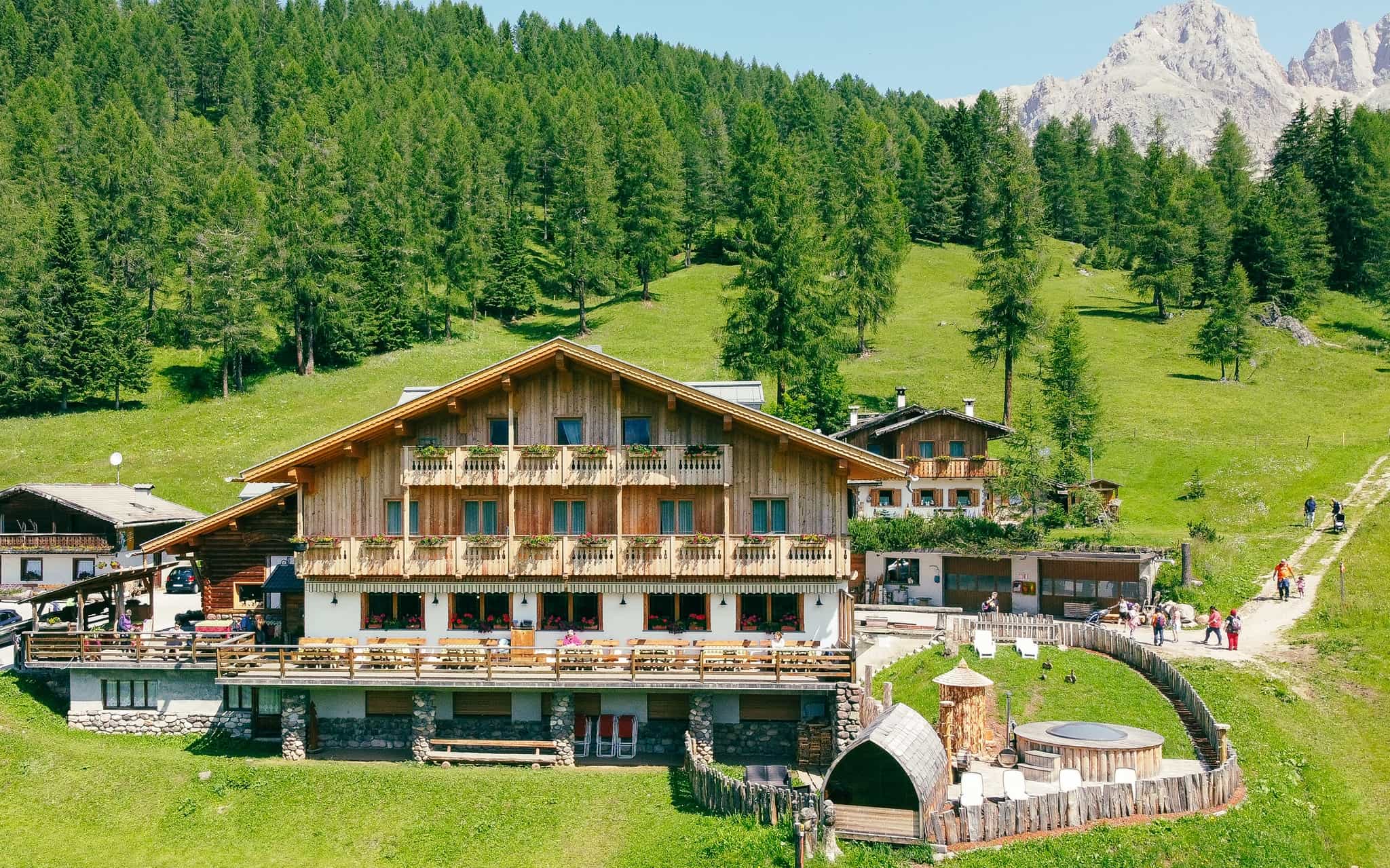
Passo San Pellegrino
On Day 5 your last hike in the Dolomites ends with a descent from the high mountains to the area around Passo San Pellegrino (1918m). Your home tonight is the stunning and comparatively luxurious Rifugio Flora Alpina, where you can enjoy complimentary access to their Green Wellness Spa which includes a hydromassager, a biosauna, a Kneipp path and a "sensory" outdoor shower. The Rifugio Flora Alpina has a more room types than the higher mountain huts, including a few double rooms. Whilst they aren't part of the standard multi-share allocation for the group, if available, you may be able to upgrade at check-in for a local supplement should you so wish.
Groups visiting mid-September onwards will stay at the Hotel Costabella, situated at Passo San Pellegrino just 2km further along the trail. This is an equally lovely and historic hotel offering delicious food and a wellness centre (which includes a Turkish Bath, sauna and "special-effects" showers) ideal for you to recover and relax after hiking in the mountains.
Upgrades
Due to the style and limited capacity of the accommodation used on this trip, a private room upgrade is not available as an optional extra.
This trip has been rated as Challenging
This trek requires a good level of fitness and is ideal for steady-footed, keen hikers. There is a mix of moderate hikes and more challenging trails with considerable elevation gain and loss each day, so previous hiking experience and good stamina is recommended. There may be the occasional ascent and descent on rough terrain and scree, but no technical or exposed sections, and the stunning views will be more than enough reward for your effort. You should be confident walking for up to 6-7 hours a day carrying your 35-40L pack between the refuges for three days – packing light is recommended! If this is your first experience trekking hut to hut, we recommend putting in some training with a weighted backpack beforehand (please see the FAQ regarding luggage, too). Similarly, if you are not used to multi-day treks then putting in some long weekend hiking trips and physical preparation in advance wouldn't go amiss.
The Dolomite Mountains offer some of the best weather in all of the Alps. The summer months (mid-July to September) have warm temperatures and plenty of sun. It is also not unheard of for snow to fall on higher ground during the summer, and patches of snow may still be present into July. While the average maximum temperature may reach some 30°C (86 °F) on the valley floor, it might get a little fresh in the wind or in the shade. July and August are the hottest months and carry the greatest risk of thunderstorms, which can be torrential and usually occur in the afternoon. Being well-prepared and equipped for all these eventualities is essential.
Beautiful Hikes, Wonderful Guide
Barbara was an incredible guide - knowledgeable, encouraging and always supportive. The tour offered a perfect mix of culture, nature and adventure. I enjoyed the friendly atmosphere and sense of community at Rifugio Tissi, the good food at Rifugio Carestiato and learning about the local wildflowers in the Dolomites. I’m heading home feeling inspired and more confident to take on future hikes!

Such a good time!
The hiking, the food and experience was amazing! I had such a good time!
The views in the Dolomites
The views in the Dolomites were amazing and I enjoyed the scenery, hikes and the animals we saw. The hikes, especially the first two days, are challenging so you need a good level of fitness. The rifugios were rustic and authentic and the meals and beds were much better than I expected for mountain huts. Miki and her team organised everything very well and kept us up to date at all times. The people on the trip were very nice. It would have been good to have had a second guide due to the differing walking speeds of the group.






Amazing Trip
We had the most amazing time away for my fiancés 30th birthday! Saw the most amazing views, and met some incredible people! Our guide Evaristo was extremely experienced and the most fantastic guide, we were so lucky to have him show us the beautiful Dolomites. Would 100% recommend.





Excellent hike, book it
This was, hands down, the best hike I’ve ever done! From the very beginning, everything was flawlessly organised by Miki. Our guide, Barbara, was absolutely incredible – truly the BEST I’ve ever had.
The hike itself was both challenging and rewarding, with breathtaking scenery that changed every single day. The variety was simply stunning.
The group was full of like-minded hikers, which made the experience even more enjoyable. I genuinely highly recommend this hike – it’s without a doubt one of the best in Europe.
Don’t think twice – just book it!
Unforgettable memories, breathtaking views, shared with beautiful souls.
An amazing trip! Our guide, Barbara, was an absolute gem – knowledgeable, passionate, and led us with such expertise throughout the journey. Miki, our organiser, was highly communicative and ensured everything ran smoothly from start to finish.
I lost a personal item during the trip, and both Barbara and Miki went above and beyond to help. Thanks to their coordination and support from others in the refugios, my item was safely returned to me by the end of the trip.
I was in the company of truly amazing people - fun, kind, and supportive that made the trip so special.
Highly recommended! Just a tip: pack light. With the challenging ascents and descents, every gram really does count, as a wise friend said.


Amazing trekking in the Dolomites
Spectacular scenery, brilliant guide and a group of really lovely people.










Delight in the Dolomites
This was an incredible experience hiking in the Dolomites. Each day was filled with majestic views, brilliant food and great chat with a group of like minded friends. The hikes on days 1 and 2 were more challenging than those on days 3 and 4. The routes took in some of the quieter sections of the Dolomites and so it never felt too busy or overcrowded. The efforts were definitely worth it and I would highly recommend this trip!






An adventure beyond my dreams
For many years, I had hoped to walk in the Dolomites. MBA made my dream happen and the organisation and execution by Miki (and Patrizio) were 2nd to none. The choice of refugios we stayed in, points to stop for coffee and food, and the hotels; these were absolutely superb. The Dolomites themselves just take the breath away (literally!). I would highly recommend this trip.
Great group, incredible scenery and
Great group, incredible scenery and experience. Highly recommend this trip!



Breathtaking and authentic
It was an incredible experience with ~60 km hiking in 4 days, demanding at times (~4500m ascending and ~4000m descending in total) but definitely rewarding! It was my first time ever doing such a hike, but to be fair I am in my early 30s and have good physical condition. Our host Miki and our guides Giacomo and Luca were amazing, attentive and very knowledgeable. Our group was also really nice, consisting of solo travelers only. I am already looking for other hiking trips!
Superb!
If I could give 10 stars, I would. The Wild in Dolomiti team was fantastic, their execution flawless, and their care genuinely personable. Hiking the Dolomites was an incredible experience! Miki and Fabrizio, a wonderful couple, run the company, and Chiara was our guide. They're Italian through and through—lovely, passionate, caring, hilarious, a little crazy (in the best way), and refreshingly direct. Our group had a great time, and we were looked after at every step. The hike was both challenging and rewarding, the refuges were clean and comfortable, and the meals were hearty and satisfying.
During the trip, one of my personal items was stolen. Although it had nothing to do with the organizers, Miki was visibly frustrated and took the situation as seriously as if the item were her own. She went above and beyond, helping me daily despite her busy schedule. She even personally arranged for the item to be returned to the UK and paid for the shipping herself (She absolutely did not have to). Her genuine care for people’s experiences is evident, and she’s driven by a deep passion for the Dolomites, her heritage, and her country.
I highly recommend them! Look no further!




Dolomites Magic :)
Dolomites didn’t disappoint. Just wow! A great balance of more & less demanding hikes - but don’t under estimate the altitude effect - you still need a very good level of fitness. Scenery is epic & hikes cover sections of the Alta Via 1 & Alta Via 2. Miki’s ‘ground control’ communication & management of trip details was faultless. Our Italian mountain guide Luca G was awesome. His knowledge of the mountains was endless & fascinating. Expertly cared for every member of the group AND perfectly timed each day to avoid any dodgy weather that was forecast - always preferable to arrive at your Rifugio dry in my opinion!! So many laughs with strangers who became MBA family by the end. Sharing time on the mountain does that. Highly recommend this trip….if I could give it 6 stars I would!

Excellent organised 👌
It was a really nice trip, extremely well organised. Miki treated us like family and looked after us. The route was challenging at times but the guide took good care of us and adapted to everyone’s abilities. Accommodation & food was also great. Thank you Miki, Chiara and Fabrizio for a nice experience




Incredible trip. Great communication. Amazing nature.
The group was great and the communication from Miki was excellent. The guide was knowledgeable and very nice! The route was challenging but very fun and gorgeous views. Highly recommend!








The most amazing hiking trip…
If you have ever dreamed of hiking in the Dolomites, eating tasty Italian food whilst drinking Aperol’s with dramatic landscapes and views - then book this trip now! We had an amazing group that made the trip even better, we had so much fun and laughter as some of the days were challenging (temperature and altitude were a big factor so bear this in mind when booking. Get some practice on the stairmaster or even better up some mountains!) Our guide Luca was so insightful and kind, getting us from A to B safely every day. The Refugios had lots of food and drink options considering how remote you were (plus, where else would you ever get a good quality glass of red wine for €3?!) 10/10 MBA - please book this for truly a trip of a lifetime :)










Amazing experience, highly recommend!!
My partner and I booked on this trip and absolutely LOVED it! We had an incredible group with likeminded adventurers, and we all had such a ball together. The accommodation was amazing - some of the most scenic views we’ve ever seen and for sure, will never forget! The food was also great (1 of us is veggie) and you can’t beat €2 wines at the refuggio! The walks were so unique covering the best and most scenic sections of Alta Via 1 and 2 (and off the beaten track avoiding crowds!)- the trails included mountains, valleys, a lake, woodlands, ridges, meadows, flats and steep inclines. Day 3 (day 2 hiking) was a bit more technical and difficult so would highly recommend taking poles if you suffer from bad knees or just want a bit more help! MBA/the local guides were very helpful and accommodating throughout. We have also learned that this is the only trip in the Dolomites where you can get some of your luggage half way, avoiding the need to carry all your stuff for the whole trip! (Yet we still managed to overpack!!) The trip was 100% worth the money! ⭐️ ⭐️ ⭐️ ⭐️ ⭐️





Amazing Holiday
We had a fantastic time on our trip. All information provided by Miki before the trip was great and didn'tleave many more questions to be asked, the walks themselves were surrounded by breathtaking views. The rifugios made great accommodation. Great food and great drinks options, was not expecting a draft beer in a hut in the middle of nowhere. Our guide Luca was fantastic and answered all our questions and concerns and kept us all going. A decent level of fitness is required and I say you need to put in some training before departing on this kind of trip. Our group all had a great time and I would recommend this tri0 to anyone. The last Rifugio was great and had a wellness area with a jacuzzi and sauna for us all to unwind after 4 hard days of walking.
Itinerary Activities
- Guided hike along the Alta Via 1 to Rifugio Tissi
- Guided hike through the Moiazza range to Rifugio Carestiato
- Guided hike through the Val Ombretta to Rifugio Onorio Falier
- Guided hike along the Alta Via 2 and the Alta Via dei Pastori to Rifugio Flora Alpina
- Access to the wellness spa at Rifugio Flora Alpina
- Guided hike to the San Pellegrino pass
Guides
- Expert, local, English-speaking mountain guides
Accommodation
- 2 nights in comfortable spa hotels
- 3 nights in cosy Italian mountain huts
Meals
- 5 tasty breakfasts
- 5 hearty hot dinners
Transfers
- Group arrival transfer from Venice Marco Polo Airport on Day 1
- Group departure transfer to Venice Marco Polo Airport on Day 6
- Transfers during the trip
Porterage
- 2 luggage transfers during the trek
Our trips are hassle-free by design. We include all the activities and equipment, as well as many of the meals, so you can simply rock up with your rucksack and share the adventure with your new pals.
Travel to and from the trip
Our trips do not include flights, trains or other travel to the start point and back from the end point.
Some meals
Lunches are not included, but you can buy your own as you'll stop each day at great mountain huts serving a choice of sandwiches or hot meals. You should budget around €40 per day in total to cover your lunches, snacks, drinks and showers.
In total your host recommends having €200 with you in cash for this trip – whilst staying up in the mountain huts on Days 2-5, it is not always possible to pay for items by card.
Tips
Tips are not included in the trip cost. These are entirely at your discretion but there is an expectation to tip for good service. Your guide will help with advice, however we suggest the below as a guideline:
- €30-40 per person, per trip
Of course, you are free to tip more or less, and the amount should be reflective of your perception of service and quality - a tip is not compulsory and should only be given when you receive excellent service.
Personal Expenses
You know your own spending habits best, so please budget an appropriate amount for things like optional meals and drinks, shopping, optional activities, and laundry.
Travel insurance
Travel insurance is compulsory for all of our adventures and you are required to provide your policy information before departing. Your insurance should include adequate protection for overseas medical treatment, evacuation/repatriation, your baggage and equipment and the specific activities involved on your adventure. We also strongly recommend it includes cancellation and curtailment insurance, should you be unable to join your trip for specific reasons such as illness. Our recommended travel insurance provider is Campbell Irvine, as their insurance offers all of the above.
Visas
Visa requirements often change, and you are responsible for obtaining any required visas for this trip. Please check with your nearest embassy or consulate for up-to-date advice.
What's included?
Bedding, blankets, and pillows are provided at the refuges
What do I need to bring?
BAGS
- Main luggage: one duffle bag or soft suitcase is ideal, with a maximum weight of around 15kgs (if you're travelling with extra baggage, please read the Excess Luggage FAQ)
- Hiking backpack: 35-40L rucksack with rain cover, suitable for carrying three days worth of kit whilst staying in the mountain huts. You'll be able to access your main luggage on Day 4 to swap out dirty clothes for clean ones
- Recommended: waterproof liner/dry-bags for keeping contents of backpack dry if it rains
CLOTHES
- Lightweight waterproof and windproof jacket
- Breathable wicking layers
- Fleece jacket or similar
- Buff or neck scarf
- Lightweight trousers/shorts/skirts for hiking
- T-shirts
- Underwear and socks
- Sunglasses
- Sunhat
- Gloves
- Something to sleep in
- Hiking boots (worn-in)
- Lightweight shoes for refuges
SLEEPING
- Sleeping bag liner and pillowcase
OTHER
- Quick-dry towel
- Universal travel plug adapter
- Power bank or solar charger
- Passports (and visas)
- Travel insurance documents
- Suncream
- Personal first-aid kit (inc. blister treatment such as Compeed)
- Personal items (biodegradable toiletries, sanitary wear etc)
- Toilet kit (toilet paper, biodegradable bags to carry paper out to dispose of)
- Alcohol hand-gel
- Headtorch or torch
- 2 x 1-litre reusable water bottle
OPTIONAL
- Earplugs
- Hydration salts, energy bars and snacks
- Trekking poles (highly recommended)
No optional extras are available for this trip.
We partner with the World Land Trust to ensure this trip achieves Net-Zero emissions. We also support their Buy an Acre programme, helping local communities to buy and protect natural habitats in perpetuity.
What's the number?
It works out on average at 170kg of CO2 emissions per person, including all local transport, accommodation, food, activities, guides, staff and office operations.
The only thing it doesn’t include right now is flights and travel to the destination. We do make an overall estimate across all our customers separately, but as we don’t book flights, have customers from all corners of the world, and no way of reliably knowing their travel plans, we simply can’t include an individual number in the figure on display here. We’ve got a goal to fix that, so that when you book, there is a way to measure and mitigate the carbon emitted by your flight too.
But what does the number mean?
Yep, hard to picture eh? To give you an idea:
- Driving 1000 miles/1609km would be approximately 281kg of CO2 in an average car (or 140.5kg per person, if there were two of you in it).
- A return economy class flight between London and New York would be approximately 1619kg (1.66 tonnes) per person.
- 10 trees in a temperate forest are estimated to remove approximately 250kg of CO2 from the air in a period of 5-10 years.
What are we doing about it?
Our trips are relatively low-carbon by design, and we're working with all our hosts to develop long term carbon reduction plans. We partner with the World Land Trust to ensure this trip achieves Net-Zero emissions. We also support their Buy an Acre programme, helping local communities to buy and protect natural habitats in perpetuity, ensuring the protection of the reserve and its wildlife.
Want to know more?
Amazingly, no international travel company has ever publicly published their carbon measurements before, as far as we know. We believe that must change, quickly. So we’re openly sharing the method we used in the hope that other companies will be able to more easily follow suit and build on what we've done so far. You'll find it all here.
Marta Marinelli, raised in Italy’s serene Prosecco Hills, dreamt of global adventures, inspired by her father's travel stories. Her passion evolved into a career, backed by a decade of studies including degrees in international tourism and destination management. She’s worked in the adventure travel sector since 2012, living in Italy, the UK, and now sunny Portugal.
Over twenty years, Marta has explored over 55 countries, visiting remote areas like Ghana, Rwanda, Sao Tome and Principe, Haiti and Nepal’s Upper Mustang region. As a Senior Adventure Expansion Manager at Much Better Adventures, she focuses on creating life-changing experiences, ranging from multi-activity adventures, challenging treks to ultimate adventures in iconic places. She loves the challenge of finding the best local adventure hosts around the world, collaborating on adventures that offer genuine immersion, pushing beyond the beaten path and working on exclusive itineraries that challenge your comfort zone.
What makes her tick? Enabling people to live adventure-rich lives while positively impacting and empowering local communities around the world, generating sustainable opportunities for both the host, guides, community, and the environment.
Whilst staying up in the mountain huts on days 2-5 it is not always possible to pay for items by card, so it is recommended to have cash with you. Lunches are not included, but you can buy your own as you'll stop each day at great mountain huts serving a choice of sandwiches or hot meals. You should budget around €30 per day to cover your lunches, snacks, drinks and showers. In total your host recommends having €200 with you in cash for this trip.
The local tap water is safe to drink. Please bring along your own reusable water bottles (at least 2L) to fill up at the mountain huts to avoid buying single-use plastic bottles.
Yes, but as a reminder first, in terms of bags your host recommends all you need is: a hiking backpack approx. 35-40L to carry your essential items for 3 days at a time, plus one main piece of luggage, max. weight 15 kgs. There is a 15kg weight limit, one bag per person, for your main luggage as your host has to arrange for the luggage to be transferred during the middle of the trip to Agordo.
On Day 1, on arrival at Hotel Orso Grigio, your host will need to collect your main bag so it can be stored until Day 4 (at their office, which is a 1hr drive away). It is best if you arrive on this trip with your hiking backpack already packed ready for the hiking to start on Day 2. Your host will wait at the hotel for 30mins or so whilst everyone gets checked in and sorts out their last bit of packing, before collecting the main bags to be stored until Day 4. There is a shop in Pescul open till 7:30pm should you need any last minute supplies.
On Day 4 your host will bring your main luggage to Agordo, where they'll meet the group around 11am, giving you an opportunity to swap out dirty clothes for clean ones. The location where the van will park in Agordo is open air, and there is the possibility it could be raining, so having your luggage organised so you can swap over kit quickly is a good idea. There is a restaurant nearby for an early lunch, with a planned stop time of one hour in Agordo, before transferring 40mins or so up to Malga Ciapela to start the second part of your hike.
For those travelling with additional suitcases or large heavy luggage, perhaps you're in the middle of a longer trip for example, you won't have access to this luggage during the trip. Please note that luggage space in the host's vans used for the airport transfers is limited. Your host may be able to store smaller/lighter items of luggage (max 8kg) during the trip at their office, but for bigger/heavier items of luggage they should be stored at Venice Airport. There is a convenient left luggage storage office at the airport, located next to the left side exit from the arrivals area on the ground floor, where you can store any excess luggage for the duration of the trip for a charge (approx €9-€15 per day depending on item size and duration).
You'll be accompanied by a local expert qualified mountain guide, leading a group of 8 trekkers maximum. Please note that you will only meet your guide on Day 2 of the trip. However your host will provide you with all the details and info you need to meet your group for dinner at the hotel on Day 1. A Whatsapp group will also be created ahead of departure to facilitate communication.
If poor weather comes in (such as storms, heavy rain and poor visibility), depending on the stage of the trek your host will consider the conditions and plot an alternative route which may involve sitting out any extreme weather in one of the huts. This is an unlikely event in the summer months, but your hosts are experienced mountain guides with a lot of successful treks in this part of the world under their belt, so you are in the best of hands.
Sure can! Over 70% of our travellers travel solo, it’s a great way to meet like-minded people.
Our team of Adventure Hunters co-create exclusive adventures which are run by highly vetted, specialist hosts. The trip is run by our trusted host partner in the destination. We only work with independent, local, in-destination experts who know the very best places to explore and how to stay safe. Read more information about the local teams we partner with. You’ll be introduced to the host straight after making a booking via the Much Better Adventures platform.
Much Better Adventures refer to the UK Government’s official travel advice when designing trips and monitoring trip operations. We recommend that all customers are familiar with the practical information provided on the Government’s FCDO website, where current travel advice can be found by searching for the applicable destination(s).
For customers joining this trip from other international destinations – please also read the official travel advice applicable to your country of residence/origin, as this may differ.
We recommend checking out the country-specific information and also talking to a travel nurse.
We automatically convert prices from the local currency that a host receives to your chosen currency. We update our exchange rates on a daily basis so this does mean that prices displayed on the site are subject to currency fluctuations, which is why you may see them change over time.
If you wish to change the currency you pay in, head to the bottom of the page.
All of our group adventures are specially designed for adults to enjoy as we want these adventures to bring together outdoorsy people who are truly like-minded. You must be over 18 to join one of our trips.
You're always in good company on one of our adventures.
Our trips are typically made up of a mixture of solo travellers and small groups of 2 or 3 friends, with most in their 30s-50s.
Our sociable adventures are solo-friendly by design and naturally attract outdoorsy people with a shared mindset; a love for adventure, a desire to push themselves and meet awesome, like-minded people along the way.
It’s this camaraderie that has so often turned a great adventure into a life-changing one.
Don't just take our word for it:
- 95% of people rate the group dynamics on our trips 5/5
- 90% of people recommend joining a trip to make new friends
- 75% of people have met people on our trips that they would now consider friends
See here for more info about the Much Better Adventures tribe.
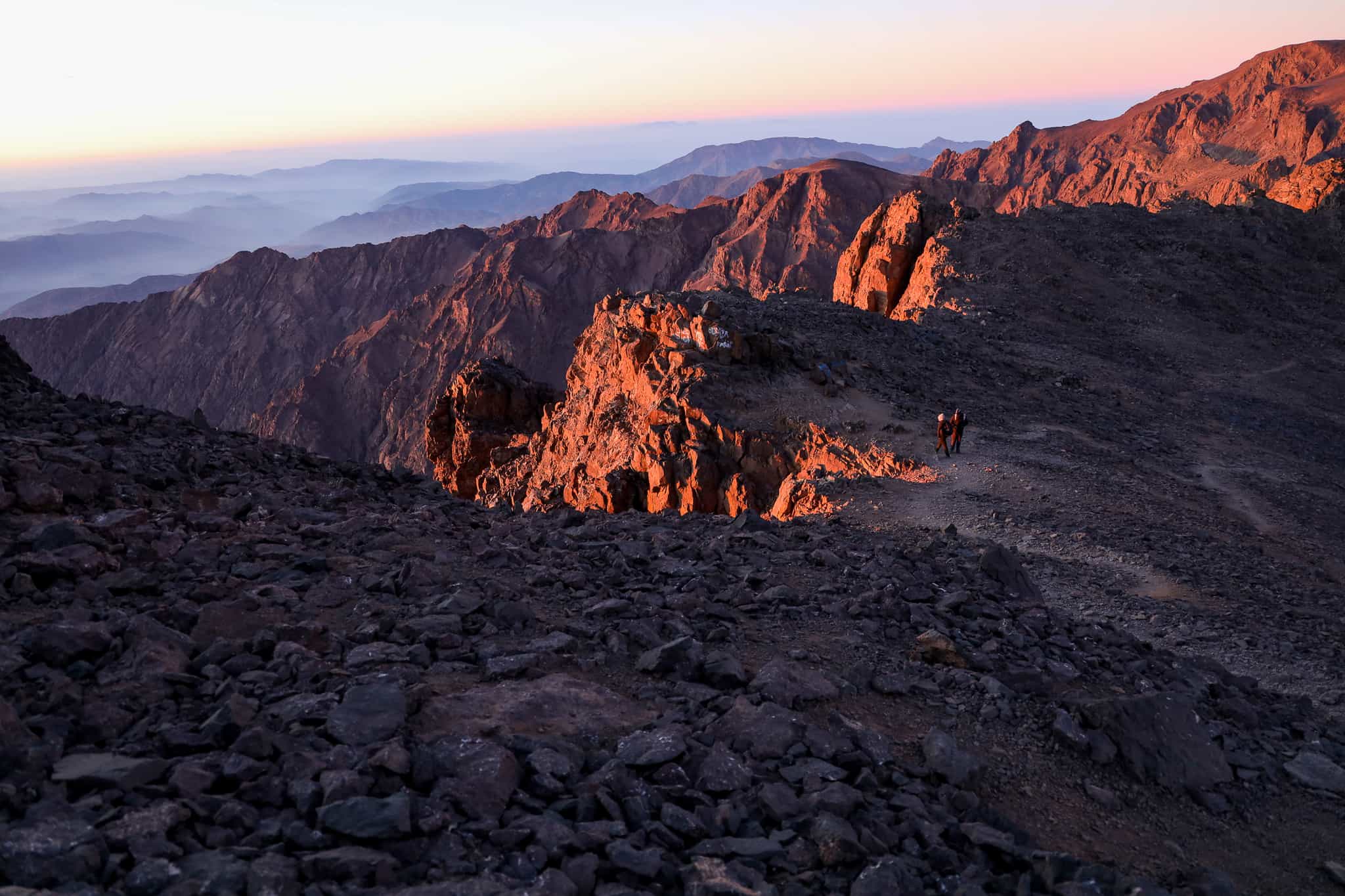
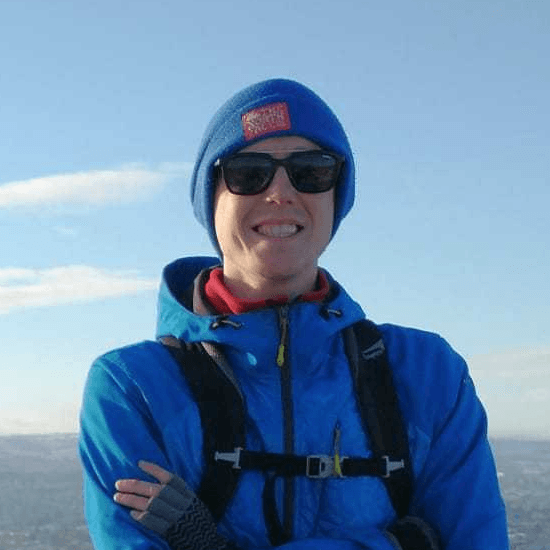
Need help finding flights?
From logistics and how to get there, to fitness, group dynamic and trip difficulty, Rory and his team of friendly experts are on hand to help.
We've got your back
Guaranteed to run
All Much Better Adventures trips are now guaranteed to run. Once you’ve booked your spot you can immediately make your travel arrangements, no uncertainty, no hanging about (excludes 'request to book' departures). Full details
Flexible payments
Secure your spot with the minimum deposit and pay off the remaining balance in as many instalments as you like, with no interest or fees. Full details
Happiness Guarantee
We’re so confident you’ll have an amazing time we’ll put our money on it. Full details
Full financial protection
To give you complete peace of mind Much Better Adventures is backed by ABTOT, ABTA and ATOL memberships. Full details
Tried & Trusted
Much Better Adventures is rated ‘Excellent’ on Trustpilot with over 1000 verified trip reviews averaging 4.8/5.
Connect before you go
You'll be invited to join a WhatsApp group to get to know each other before your big adventure together. Full details
DEPARTURE DATES
Friday 18th July 2025
to Wednesday 23rd July 2025
Fully Booked
Monday 21st July 2025
to Saturday 26th July 2025
Fully Booked
Tuesday 29th July 2025
to Sunday 3rd August 2025
Fully Booked
Wednesday 30th July 2025
to Monday 4th August 2025
Fully Booked
